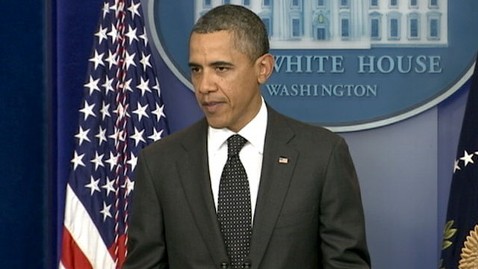Obama Threatens Veto on Bid to Avoid Automatic Cuts as Supercommittee Fails

ABC News
President Obama said today he will veto any efforts to get rid of the automatic spending cuts that will be triggered by the supercommittee’s failure to reach a bipartisan solution to deficit reduction.
“There will be no easy off-ramps on this one. We need to keep the pressure up to compromise, not turn off the pressure,” the president said this evening. “The only way these spending cuts will not take place is if Congress gets back to work and agrees on a balanced plan to reduce the deficit by at least $1.2 trillion.”
The $1.2 trillion in cuts that will be triggered are divided equally between social programs and defense spending. Republicans have dubbed the defense cuts “draconian” and, following news of the supercommittee’s failure, said they are now working on a plan to minimize the impact of the sequester on the Department of Defense.
But the president today flatly said he won’t accept any such deal and urged the two sides to continue working on an agreement.
He squarely placed the blame on Republicans for failing to come together on the deal that was to have been inked by midnight tonight.
“There are still too many Republicans in Congress who have refused to listen to the voices of reason and compromise that are coming from outside of Washington,” Obama said. ”At this point, at least, they simply will not budge from that negotiating position. … That refusal continues to be the main stumbling block.”
The c0-chairs of the supercommittee, Rep. Jeb Hensarling, R-Texas, and Sen. Pat Murray, D-Wash., said they were “deeply disappointed” by the lack of a deal to cut $1.2 trillion from the budget.
“After months of hard work and intense deliberations, we have come to the conclusion today that it will not be possible to make any bipartisan agreement available to the public before the committee’s deadline,” the two said.
But they pledged to continue the talks.
“I knew that it would be hard to do,” Murray told reporters. “I think we all know that our country is divided. Certainly the committee had different philosophies. … I am disappointed tonight that things I cared about deeply, which is getting our country back on track and making shared sacrifice, aren’t the result of this committee’s hard work.”
Tax cuts were one of the biggest dividing factors between the two sides.
Democrats blamed Republicans for avoiding “voices of reason.”
“I am disappointed that Republicans never found the courage to ignore Tea Party extremists and millionaire lobbyists like Grover Norquist, and listen instead to the overwhelming majority of Americans — including the vast majority of Republicans — who want a balanced approach to deficit reduction,” Senate Majority Leader Harry Reid, D-Nev., said in a statement.
House Democratic leader Nancy Pelosi, D-Calif., blamed Republicans for not bending on tax cuts for the wealthy.
“The plan could not be balanced because Republicans insisted on extending the Bush tax cuts for people making more than a million dollars a year and repealing the Medicare guarantee — while refusing to accept a jobs proposal,” she said.
Republicans blamed the left for rejecting their “good faith” proposals.
“In the end, an agreement proved impossible not because Republicans were unwilling to compromise, but because Democrats would not accept any proposal that did not expand the size and scope of government or punish job creators,” said Senate Minority Leader Mitch McConnell, R-Ky.
House Speaker John Boehner, R-Ohio, steered clear of playing the blame game, only saying that “the House will forge ahead with the commitments.”
There were early signs that the supercommittee would not be able to reach an agreement, but there was a last-minute effort by a few members of the committee to salvage something.
A bipartisan group comprised of Sens. Jon Kyl, R-Ariz., John Kerry, D-Mass., and Rob Portman, R-Ohio, met in the Capitol this afternoon. Senate aides said Kerry and Kyl also spoke earlier this morning.
But the two sides failed to come together despite a public show of optimism.
Kyl, who had indicated that the talks were not fruitful, said this morning that the result of the supercommittee is one of the biggest disappointments of his career. Kyl is retiring at the end of his term.
Sens. John McCain, R-Ariz., and Lindsey Graham, R-S.C., said they are now working on a plan to minimize the “draconian” impact of the sequester on the Department of Defense, which will bear half of the $1.2 trillion in budget cuts.
The cuts would begin in 2013, when the Congressional Budget Office estimates that the Defense Department would have to slash 10 percent, or about $550 billion, from its budget. Combined with the $450 billion worth of cuts already planned, that would amount to $1 trillion in the next decade.
“These cuts represent a threat to the national security interests of the United States, and cannot be allowed to occur,” McCain and Graham said.